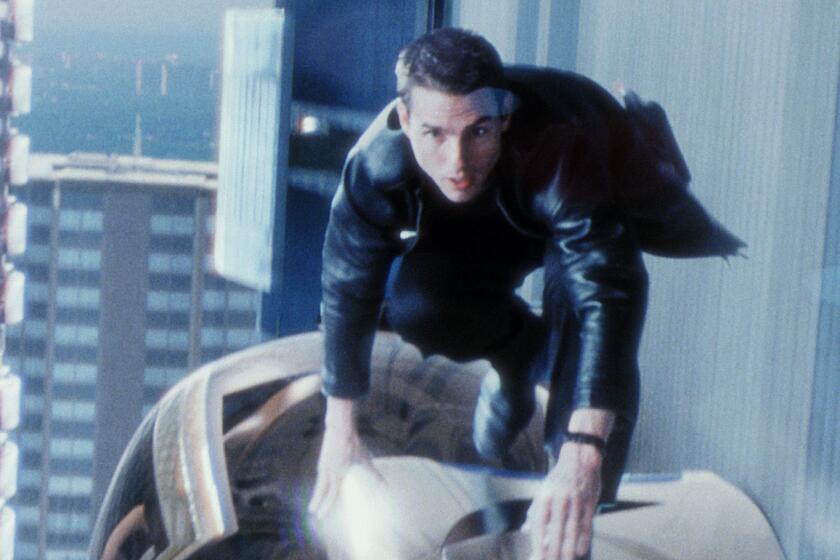Indie ‘Castle’ Prospers on Shanty Budget
- Share via
As “Titanic,” which cost more than $250 million to make and market, continues to dominate the box office, the current Sundance Film Festival is a reminder of how many smaller, mini-budgeted movies are made outside the studio system for far less than $1 million.
And, like many of those independently financed films now screening at the prestigious festival in Park City, Utah, the quirky Australian comedy “The Castle”--made for something over $500,000--is on the prowl for a U.S. distributor.
Unlike most of the offerings, the film has already been a big hit in its native land, outgrossing 1996’s popular drama “Shine,” collecting nearly $8 million in box-office receipts and shipping about 36,000 videocassettes.
Executives from such American distributors as Miramax, Gramercy Pictures, New Line Cinema and PolyGram attended a screening of “The Castle” on Monday at Sundance, where, according to executive producer Michael Hirsh, “there’s been substantial interest by U.S. companies for the distribution and remake rights.”
Officials from Village Roadshow, Australia’s largest entertainment concern, which both financed and released the film, were confident that a deal with a U.S. distributor would soon be in hand.
“There’s a bit of a frenzy,” said Greg Coote, president of Village Roadshow’s Los Angeles-based operation.
If “The Castle” is lucky enough to land a domestic distribution deal--there are numerous Sundance movies each year that don’t--that’s certainly no guarantee that it will catch on with American audiences the way it was embraced Down Under.
Over the years, many films that have generated great buzz, been hotly sought after at Sundance and dearly paid for by Hollywood distributors have turned out to be disappointments at the U.S. box office.
But no degree of lousy odds ever seems to dissuade independent filmmakers from pursuing their cinematic passions--even if they’ve never made a movie before.
Such was the case when one of Australian TV’s most successful comedy-writing teams and series creators decided to give feature filmmaking a shot.
“The Castle,” a biting, offbeat comedy about a tow truck driver who fights government authorities and the legal system to save his family’s humble home from the ever-expanding airport next door, marks the directing debut of Rob Sitch, who wrote the screenplay with his partners, Jane Kennedy, Santo Cilauro and Tom Gleisner.
*
The creative team was behind Australia’s popular live TV comedy series “The Late Show” as well as “Frontline,” a satirical drama set behind the scenes of a fictional current-affairs program, both of which have won several Australian awards.
In 1996 the troupe took a year off from “Frontline” to work on other projects. Armed with a digital camera, Cilauro hit the campaign trail and filmed a two-hour documentary called “The Campaign” about the Australian national election. Sitch and Gleisner completed a six-part comedy-travel-fly-fishing-adventure series, “A River Somewhere.” Then the team decided to tackle its first motion picture.
It approached Village Roadshow about funding and distributing that proposal, which was more expensive than “The Castle,” but a deal never materialized.
“They were making suggestions we didn’t like,” said Hirsh, who has worked with the creative foursome since the members teamed up in 1991. “We don’t show our TV scripts to anyone other than for broadcast regulations or legal reasons.”
The producer recalled how offended the team was when a representative from Roadshow asked: “What do you know? You’ve never made a movie before.”
Roadshow’s Coote readily admits that given their lack of movie experience, “we hesitated.”
The team then decided to self-finance one of their less expensive ideas--a simple comedy titled “The Castle”--which was shot on Super 16-millimeter film in 11 days and edited in five, with the cast and crew deferring their salaries.
“It was a big risk for us,” Hirsh said.
“We knew we had enough money for 10 days of catering, so we worked backwards and shot it in 10 days,” he added, explaining that their film company, Working Dog Productions, cut every corner it could to make the movie.
“Anything that’s legal, we did,” said the executive producer. Preselling the Australian pay TV rights to Showtime helped “guarantee part of our deferments.”
After wrapping the movie, the filmmakers showed Village Roadshow a rough cut in hopes of securing a distribution deal.
Coote said executives at Roadshow loved it and decided to pay for all the finishing costs (including blowing the film up to 35 millimeter) as well as acquire Australian distribution rights and the right to sell the film around the world. (Distribution rights for Britain and South Africa were sold to Paramount Pictures.)
*
The filmmakers and Roadshow, which jointly own the copyright to “Castle” and share in the profits, were surprised at the film’s success when it was released in April in 86 theaters throughout Australia. It went on to become the highest-grossing home-grown film of 1997. It ranked 13th among all releases in Australia last year, when such big American-made movies as “Men in Black,” “Liar Liar” and “The Lost World” dominated the box office.
More to Read
Only good movies
Get the Indie Focus newsletter, Mark Olsen's weekly guide to the world of cinema.
You may occasionally receive promotional content from the Los Angeles Times.










